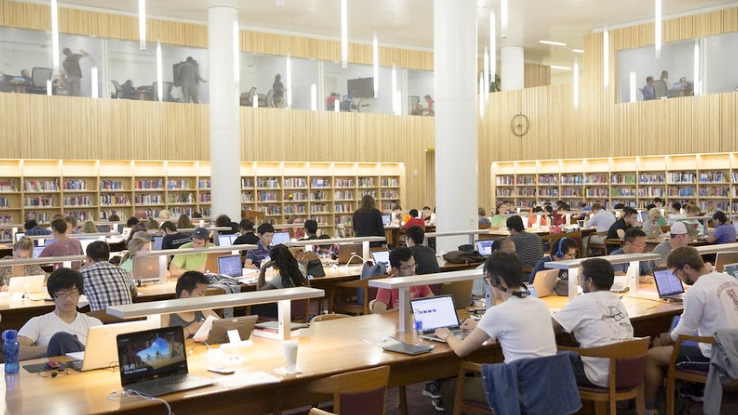
Research training for undergrads, at their convenience

“Engineers are innovators,” says Michelle Leonard, Research Librarian for Engineering. “They are asked to solve problems and develop solutions where there is no manual or guidebook. And they definitely cannot use Google or text a friend for answers.”
Here lies an opportunity—since undergraduate engineering students aren’t explicitly learning how to do information research, how do they further develop these research skills to back up their problem-solving skills?
That’s where Library Research Skills Learning Modules come in. This series of video classes for early-career researchers thoroughly covers the research practices of engineers with a bent toward connecting them with essential resources available at NC State through the Libraries.
Leonard and Kristy Borda, Research Librarian for Engineering, Sciences, and Biotechnology, developed the program which is freely accessible on the Libraries website. Students can take a brief knowledge assessment to determine how best to use the modules and receive a certificate after completing the program.
“Engineering research and design requires the discovery and synthesis of technical information that can be difficult to find: scientific literature, patents, and standards,” Borda says. “That’s where librarians can provide support.”
“We have the subject knowledge and expertise to help students navigate complicated search processes, synthesize large amounts of information, and connect them with the tools and services that will serve them throughout their lives as researchers. We want students to feel empowered as not only consumers but also producers of information.”
Leonard and Borda worked with Greg Tourino, Lead Librarian for Textiles and Engineering Research Librarian on the program. Natalia Lopez, Claire Cahoon, and Walt Gurley of the Libraries’ Data & Visualization Services department also developed a module for the program.
The Libraries already offers a wealth of workshops on specific research skills, hosts programs with researchers to showcase their work, and partners with faculty members on research training and curriculum development. But Leonard and Borda wanted to reach all undergraduate researchers, not just the students who register for workshops or happen to be in proactive faculty’s classes.
“Undergraduate research experiences are conducted independently throughout various academic departments so we would often visit different labs and offer ad-hoc workshops, but we were looking for a holistic solution with a wider reach and bigger impact,” Borda says.
Leonard knows what research needs are specific to engineers—she has an engineering degree from NC State. “The information resources created by the engineering community serve as their sources of inspiration, information, and knowledge,” she says. “This includes books, journal articles, conference proceedings, dissertations, technical reports, engineering standards, and patents. Unfortunately, there is little time for students to develop the information competencies that they will need in their careers within the frame of their engineering course requirements.”
Leonard and Borda designed the modular program with certain parameters in mind. They felt that students needed self-paced, asynchronous instruction to be flexible to their busy schedules. Open access to the program was also key. And they wanted to have scaffolds for the instruction, not necessarily to replace in-person instruction but to exist as an instructional boost for students, delivered at their convenience.
The full program takes 4-6 hours to complete, including a final assessment. The video modules introduce students to Libraries resources, address literature searches, discuss how to join the wider scholarly community, give an overview of scientific communication, explore patents and standards, and show the power of data and visualization.
Before they designed the learning modules, Leonard and Borda did a listening tour throughout a variety of departments, including most engineering departments, computer science, and biotechnology. Different faculty identified the same gaps in their students’ research knowledge, such as in data & visualization, citation management, literature reviews, and scientific communication—areas that are the Libraries’ bread and butter.
“Another common theme was that, though the Libraries offers a robust suite of services, students aren’t familiar with all of them,” Borda says. “We hope that projects like this one can start to bridge the gap between library support and student research.”
And faculty are responding by adopting the program into their teaching. Biotechnology professor Carlos Goller will be using the modules as a required competency for summer researchers. The Biotechnology department hosts 10-12 undergraduate researchers from across the country (along with a handful from NC State) for their summer research program. The Library Research Skills Training Modules will be integrated into that curriculum with the goal of preparing the students for communicating their research through poster presentations.
Some departments, such as Industrial and Systems Engineering (ISE), are moving toward requiring research instruction from engineering librarians for all of their undergraduate researchers. When Leonard and Borda shared the pilot library skills module with Dr. Kanton Reynolds, Director of Undergraduate Programs for ISE, he remarked that the module captured everything a new researcher would need to know. For the ISE department, the program will serve as a supplement to in-person instruction for undergraduate researchers.
Seeing the Library Research Skills Training Modules as a kind of pilot program, Leonard and Borda would ideally like to develop customized websites to meet the specific needs of departments across the university. They would also like to extend the model to support more advanced researchers and to provide deeper insight into specific resource types. This is just the start.
“Given that the College of Engineering is large, we have only had the opportunity to make very brief connections with a small percentage of the College of Engineering undergraduates,” Leonard says. “We know we have a lot to share with undergraduate researchers to help them develop the skills they’ll need to feel comfortable finding and using the very specific types of information critical to engineers.”

